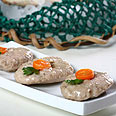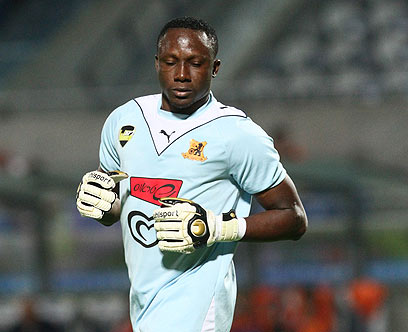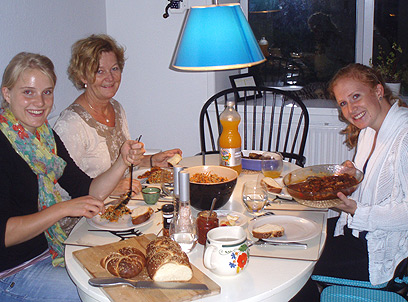
My first Rosh Hashana
Israelis abroad are known to pine for some old fashioned gefilte fish during the holidays, but how do foreigners who once lived in Israel remember them?
Being an Israeli abroad during the holidays is a strange experience – the streets are devoid of that special Rosh Hashana commotion and no one is on a mad dash for honey cakes or ready-made gefilte fish.
If celebrating Rosh Hashana overseas is strange for us, how do foreigners living in Israel feel about celebrating it? Do they miss the traditional gefilte fish and leek patties ("keftes di prass") once they return to their homeland? Do they carry on any of the traditions they experienced while living in Israel?
Dele Aiyenugba, 28, a Nigerian soccer player who plays the position of goalkeeper for Bnei Yehuda, has been living in Israel for four years. Nigerians, he told Ynet, "celebrate the new year on January 1, like the rest of the Christian world, and the traditional holiday dish in turkey."

Sense of family. Dele Aiyenugba (Photo: Eli Elgarat)
"Since living in Israel, I also celebrate Rosh Hashana with Hezi Magen (Bnei Yehuda owner, R. J.) and his family. It's a long dinner party and it's fun. It usually includes a spicy fish dish, beef and of course – apples and honey. I particularly like the beef dish, which Hezi makes himself.
"If and when I continue to (play) in Europe or if I go back to Nigeria, I'll miss the holiday's sense of family most of all," Aiyenugba said. "Maybe those spicy fish dish, too."
Denish journalist Morten Berthelsen, 26, covers local affairs for several foreign newspapers and also serves as the presenter for Golf fashion. He has been living in Israel for the past 18 months.
"In Denmark we celebrate Jul, the Nordic Silvester, on December 31. It is based on ancient Viking, pre-Christian traditions. It's probably the most important holiday in Scandinavian countries, and much like Rosh Hashana, it starts with sitting down and planning the perfect meal."
Berthelsen confessed that his favorite thing about Jul is the julefrokost dinners, which take place every weekend for the two month prior to the holiday itself. "That's probably the best tradition in our new year: You meet with family or friends or colleagues, and have all sorts of cold dishes like herring and smorrebrod and you wash it all down with drinks like Akvavit."

Morten Berthelsen (Photo: Shai Yehezkel)
In Israel, Berthelsen has so far had the chance to participate in only one Rosh Hashana dinner ("At my ex-girlfriend's family), and this year he was invited to a friend's family dinner.
"I don't really know what to expect," he said. "Last year we were in a kibbutz, sitting around a long table, and virtually the entire kibbutz was there. Food wise, I liked the fish dish the most, which was spicy, but they added some honey for the holiday.
"What will I take back with me of Rosh Hashana? I don't think I'll miss the food. What I liked the most was the sense of community and family – but we have that in our new year as well."
Monika Schmutz-Kırgöz, who spent five years in Israel as the Swiss ambassador's deputy and now serves and the Swiss consul to Istanbul, admitted to fond gefilte fish memories.
"Switzerland has a Jewish community and naturally, I've heard of Rosh Hashana before I came to Israel, but we only started celebrating it when I moved there. In the five years we spent in Israel, my family and I celebrated it with friends in Tel Aviv.
"I loved everything that was served – from chicken and lamb, which as I understand are more traditional to Sephardic families, to the Ashkenazi gefilte fish."
Schmutz-Kırgöz added that she mostly misses the company. "To tell the truth, this year – in Istanbul – we will be serving apples and honey. It's a delicious combination, and if it brings good luck – all the better!"

Marie Mogensen and her family
Marie Mogensen from Denmark has been celebrating Rosh Hashana for the past four years, although she has never been in Israel for it.
"We celebrate Rosh Hashana thanks to a Jewish friend who lived here for a while. He introduced us to this wonderful holiday and we kept on celebrating it without him, after he returned to Israel.
"We usually celebrate the new year on the last eve of December, but somehow it just makes more sense to me to celebrate it according to the Jewish tradition, after the summer break is over and everyone returns from their holidays and restart their lives – and a new year in a way," she said.
The Mogensens begin their Rosh Hashana dinner with the traditional dipping of apple in honey and a Shana Tova greeting. The holiday dinner is usually comprised of both Israeli and Danish courses.
"We enjoy the clear order of things in the holiday, since the Danish new year has no rules," she said sheepishly. "Everyone ends up making something… it's one of our favorite nights, and not just because of the food."
- Follow Ynetnews on Facebook










